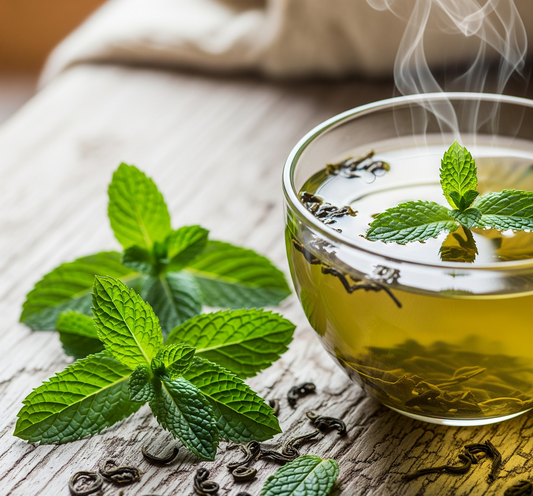With its pleasant tart and sour flavor profile, layered with notes of cranberry, Hibiscus tea is a great caffeine-free beverage for summer. Any brunch or picnic table is brightened with a tall, iced pitcher of Hibiscus tea’s gorgeous, bright red liquor, and this tea is also equally delicious as a warm, post-dinner nightcap.

Hibiscus tea can be an interesting experience for tea lovers who’ve never tried it before. The bright red brew and its subtle fragrance suggests sweetness in flavor, and so its sharp tartness can take a first-time drinker by surprise.
While many grow a deep liking to the flavor of this flower tea, many also turn to recipes to gently sweeten their brew and reduce its bite. But if you do enjoy a good, biting flavor to jolt you out of even the worst summer-time stupors, Hibiscus is right for you.
What is Hibiscus tea made of?

Hibiscus teas are made from the dried flowers of the Hibiscus sabdariffa plant, also known as Roselle, which grows across tropical and subtropical regions of the world. Hibiscus is native to Africa, but can also be easily cultivated across large parts of India and Nepal, with its flowers often used in Hindu rituals in many parts of these regions.
While every part of the flowering Hibiscus plant is edible, only the deep red petals and green sepals of the Hibiscus flower are dried to make Hibiscus tea. These parts of the plant are used used for tea, as garnish for dishes and salads. They can even be made into sauces, or eaten directly as a snack.

How to Brew Hibiscus Teas:
Brewing Hibiscus tea is a no-fuss and easy process. The first step is, of course, choosing the best flowers for fresh and uplifting flavors. When choosing your Hibiscus flowers, make sure the dried leaves have retained their vibrant, deep red color.
You'll Need:
- Kettle
- Mineral tater or tap water
- Tea pot with a strainer
- Whole Hibiscus leaves

How to Brew Whole Hibiscus Flowers (Hot):
Step 1: Bring your water to boil, and put aside for 3-4 to cool.
Step 2: Add two grams, about two spoonfuls, of dried Hibiscus flowers to your strainer.
Step 3: Pour your hot water over your Hibiscus flowers, and steep for up to 4 minutes.
Tips: Use a clear tea pot or infuser mug to monitor the color of the liquor. The darker your tea, the stronger the flavors will be. To gently sweeten your tea, use two pumps of sugar syrup.
How to Make Iced Hibiscus Tea:
To brew a pitcher of Iced Hibiscus tea, you'll need:
- 10 grams of whole Hibiscus flowers
- Kettle and pitcher
- Mineral water or tap water
- Strainer
- Ice
Step 1: Bring your water to boil and let cool for 3 - 4 minutes.
Step 2: Add 10 grams of your whole Hibiscus flowers to your juice jug.
Step 3: Pour your hot water over the flowers. Allow to steep for up to 15 minutes, until the brew has taken on a bold red color.
Step 4: Strain your Hibiscus tea over ice and serve.
Tip: Stir a couple of spoons of sugar syrup, or any natural sweeteners of your choice, into your tea to sweeten your tea. You can also add a few mint leaves for added freshness.
Hibiscus tea Health Benefits, and Can you Drink Hibiscus Tea While Pregnant:
Rich in the anti-inflammatory compound called anthocyanin, which is responsible for giving the tea its deep red color, Hibiscus tea is linked to multiple health benefits. According to one research on ResearchGate, drinking 2-3 cups of hibiscus tea daily may have played a role in improving blood pressure and potentially serve as a preventative or adjunctive therapy against such conditions. Unsweetened Hibiscus tea can also reduced oxidative stress in the body, reduce cellular inflammation, and is believed to support digestive health.
However, in the Nepali tradition, Hibiscus tea, is said to be a cooling tea, even if you drink it hot. Traditional medicine says that drinking Hibiscus tea or snacking on the dry leaves while you have a cold can worsen congestion and prolong your symptoms.
Additionally, Hibiscus tea might cause problems during pregnancy. The flowers contain compounds called phytoestrogens, which is said to induce pre-term labor and complicate hormone health. If you are pregnant or postpartum, please only drink Hibiscus teas after consulting with your doctor.




